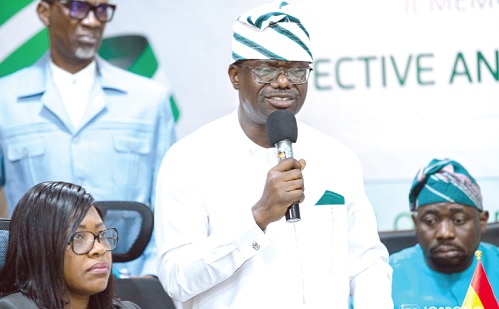
Jospong Group to build waste treatment plants in Lagos
The Jospong Group of Companies (JCG) has signed an agreement with the Lagos State Government to build waste treatment plants in Lagos, Nigeria.
Under the pact brokered through the Ministry of Environment and Water Resources (MoEWR) of Nigeria, the Jospong Group will set up a treatment plant to help manage the 13,000 tonnes of waste generated in Lagos State, the commercial capital of Nigeria.
Consequently, a feasibility study for the construction of the integrated waste management plant is currently underway.
The plant, when completed, would be responsible for receiving, sorting, processing and recycling both solid and liquid waste into useful produce.
Towards that end, a memorandum of understanding (MoU) has been signed between JGC and the Lagos State Government through its MoEWR.
The Executive Chairman of the Jospong Group, Dr Joseph Siaw Agyepong, signed the MoU for the company, while the Commissioner of the MoEWR, Tokunbo Wahab, appended his signature for the ministry.
The signing ceremony, which took place in Lagos, Nigeria, yesterday was witnessed by Ghana’s Consulate-General, Lagos State, Samata Gifty Bukari; two Advisory Board Members of JGC, Gifty Boi-Bi-Boi and Emmanuel Otchere Okomeng, and other executive members on the side of the Jospong Group, while the Permanent Secretary, Office of Environment Services, Gaji Omoboladin Tajudeen; the Managing Director of Lagos Waste Managing Authority (LAWMA) and Dr Muyiwa Gbadegesin, among others, witnessed the signing on the side of the MoEWR.
Satisfaction
Dr Agyepong expressed satisfaction with the agreement, saying the MoU would mark the beginning of a great relationship between the Jospong Group and various states in Nigeria.
He said the challenge of environmental sanitation was not merely a matter of convenience but a fundamental human right and a cornerstone of public health as stipulated by Sustainable Development Goal Six, which focuses on clean water and sanitation.
However, the Executive Chairman of the JGC said millions of citizens continued to suffer due to inadequate access to infrastructure such as proper sanitation facilities and water treatment plants.
“In Ghana, just like in Nigeria, the challenges surrounding environmental sanitation are multifaceted and deeply entrenched.
The ever-increasing numbers of environmental sanitation and its accompanying health situations are quite alarming,” Dr Agyepong said.
He said from densely populated urban areas to remote rural communities, the lack of proper sanitation infrastructure posed serious threats to public health and environmental sustainability.
Dr Agyepong added that the consequences of poor sanitation were dire, ranging from the spread of waterborne diseases to environmental degradation and disproportionately affecting the most vulnerable segments of society, including women, children and the elderly.
Waste management
The executive chairman stated that in 2006, the JGC went into waste management to improve the lives of people by ensuring environmental cleanliness using simple but modern technologies.
“My vision was to see our streets and homes clean while providing a livelihood for the youth of our beloved country.
With time, I realised there was a lot more we could do with improved technology which will not only provide sustainable solutions to waste management, but will also make life better, cleaner and healthier,” he said.
Dr Agyepong said as of now, the group has successfully established 38 sustainable sanitation infrastructure for liquid, medical, plastics and municipal solid waste, including 16 integrated recycling and compost plants.
He said those plants produced compost which was also helping to boost the agricultural sector of the Ghanaian economy.
“According to a report by the Lagos State Waste Management Agency, Lagos State produces approximately 13,000 tonnes of waste per day, and we are delighted to extend our services to Nigeria, with our focus mainly on downstream waste management,” he added.
Significant milestone
For his part, the commissioner stated that Lagos, with its vibrant population, bustling markets and dynamic industries, generated substantial amounts of waste that required innovative and sustainable management solutions.
“It is our responsibility, as stewards of this city’s future, to address these challenges head-on.
Today marks a significant milestone in our collective journey towards transforming the landscape of waste management in Lagos State,” Commissioner Wahab stated.
“As we gather to sign this MoU between the Lagos State Government and the Jospong Group of Ghana, we are not just signing a document; we are inaugurating a partnership that embodies our shared vision for a cleaner, healthier and more sustainable Lagos,” he said.
Mr Wahab said the partnership with the Jospong Group, a leader in environmental and waste management services in Africa, represented a great leap forward in the commitment to enhance the quality of life for all ‘Lagosians’ through effective waste management.
He added that together, the government with its partners would develop integrated solid and liquid waste management facilities that would not only meet the current needs of the city but also anticipate the demands of the growing population.
